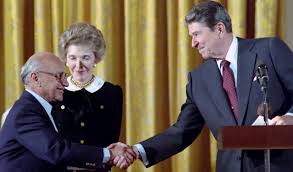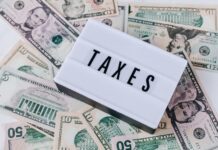Religion, noun
Archaic: scrupulous conformity
A cause, principle or system of beliefs held to with ardor and faith
Missionary, noun
A person undertaking a mission, especially a religious one
I have spent my adult life as a true believer in free markets. This belief, this faith, sprang from my exposure to libertarian thought in college, with Milton Friedman acting as my initial guide. Many more came after. I was an enthusiastic supporter of Ronald Reagan who I saw as the political embodiment of the classical liberal ideal. Jude Wanniski and Art Laffer were my heroes for advancing the cause of freedom, for freeing the US entrepreneurial spirit from the yoke of excess taxation and regulation. I was a loyal foot soldier for the Randian cause.
US economic policy since Reagan’s election has moved significantly in the direction of greater freedom. Income tax rates have been reduced and the structure has been simplified (fewer brackets). Regulations have continued to multiply but are less onerous in many ways. Trade has been liberalized with globalization lifting millions of people out of poverty around the world. And yet, from an American perspective, the results of this economic liberalization have been, in some ways, a lot less than what we were led to expect. We’ve had two banking crises (S&L crisis and the Great Financial Crisis), at least two bubbles (dot com, housing and whatever today is), several stock market crashes, and inequality has risen to a degree last seen in the Gilded Age.
I’m a nobody in the grand scheme of pushing the neo-liberal agenda (which isn’t the epithet those on the new, intolerant left seem to think). I’m not an economist or a policymaker and I have had no influence at any level of government. But I’ve been faithful to the credo that the market always produces the best result and I’ve supported politicians who espoused the free market doctrine (although once elected they don’t seem to believe as much as they did on the campaign trail). I’ve written, for whatever small audience I’ve been able to attract, from the viewpoint of a free market, laissez-faire ideologue. In short, I’ve been the loyalist, a missionary for the cause of pure, unadulterated economic freedom.
I believe deeply in the cause of freedom and economic freedom specifically. The idea of giving one (wo)man or group of (wo)men the power to block or alter a trade willingly entered into by two individuals is abhorrent on its face. Free trade – between individuals, no matter the existence of artificial barriers such as a national or state border – is not just an economic concept but also a political one that espouses individual freedom, the power to rule and order one’s own life. In an ideal world, more freedom for everyone is always the right answer. But we don’t live in an ideal world and the results of our move toward a more liberal economic order have been less than ideal too.
I can’t help but think that today’s toxic political environment is a result, at least partially, of the economic policies that I and so many others have advocated. In our zeal to enact whatever part of the liberal economic agenda we could, we made four large mistakes that have led us to our current political predicament.
First, we embraced free-floating currencies as a market-based alternative to the strictures of the gold-based Bretton Woods. We forgot what the intellectual godfather of that shift, Milton Friedman, said about the need for a rules-based monetary system. I understand that his preferred rule turned out to be wrong, but that doesn’t mean he was wrong about the need for rules. It is ironic that the failure of this free market monetary system in the 1970s – high inflation and high unemployment – paved the way for more free market liberal economic policies in the 1980s and the decades that followed.
Second, we ignored the losers from our shift to freer trade. Did any of us who vociferously supported the move to freer trade understand the human consequences for all of our fellow Americans? I have friends who still insist that NAFTA and all the other ways we pursued freer trade over the last several decades were good for everyone, seemingly oblivious to the factory workers whose jobs got outsourced to another country with weaker labor laws, weaker environmental protections, and lower wages. Try telling a middle-aged steel worker or auto worker whose entire life was upended when the factory he’d called home since high school got shipped to Mexico that he’s better off. Even if he’s recovered now, the years he lost during the adjustment are ones he’ll never get back.
Third, we did not consider the consequences of allowing the consolidation of multiple industries through mergers and acquisitions. We assumed that companies would not act in monopolistic ways that would attract attention and we were largely right. We don’t see companies overtly exercising their market power. We applauded the formation of large companies and their efficiency while ignoring their accumulation of political power. Crony capitalism is one of the few true bi-partisan efforts in DC.
And lastly, we decided at some point that “deficits don’t matter”. Our fiscal profligacy, our refusal to live within our means is what led us to sever the US Dollar’s last connection to gold via Bretton Woods. If history is any guide, it is our spendthrift ways that will ultimately undermine our leadership position in the world.
The problems we have today are political in nature but they have an economic footprint. Is there any doubt that the political fulminations around the globe today are driven by inequality, by the feeling that the playing field has been tilted in favor of the rich and well connected? I have no doubt that the pursuit of free trade has been beneficial to the world. Millions of individuals around the globe have been pulled out of poverty – desperate poverty in some cases – by the US-led neo-liberal policies the so-called liberals all decry today. Free market types have nothing to hang our heads about, to be ashamed of, for promoting freedom.
But the political upheaval gives me pause. The US occupies a unique place in the global geopolitical sphere. We are the global hegemon, the leader of the free world, the 400-pound gorilla striding across the world stage. Our polity – our unity – and how it is perceived by the rest of the world is vastly more important than it is for other countries. When the US political or economic systems – or both – are unstable the effects are felt far beyond our borders. Have our mistakes, our omissions, contributed to the instability, the current political unrest? I have no doubt the answer is yes.
What we call economics today was for most of history referred to as political economy. It is hard to separate the two and over my lifetime the division over economics has become every bit as divisive as the one over politics. The division in economics, as in politics, is over control. One side wants power dispersed widely among individuals, while the other prefers power to be concentrated among an elite cadre. I am obviously on the side of the dispersion crowd and proud of it.
One of the disappointing results of our move to more liberal economic policies is that we still ended up with a small group of elites guiding policy. It is just a different set of elites than the centralized power crowd would have chosen. And the ones with power are largely unelected and unaccountable from the perspective of national and international identities. They generally answer to shareholders – or no one – and their guiding principles are limited primarily to those that maximize their own wealth and power.
And we, the free market missionaries, have aided the global elites climb to power by ignoring the human and therefore political consequences of the policies we promote. We have pursued our free market goals with the zeal of true believers, blind to any evidence that might upset our worldview. We are guilty of what we have so often accused the other side of – assuming we know best and that there will be no ill consequences from our preferred policies.
The Failure of our Monetary System and Fiscal Discipline
In the 1960s, Valery Giscard d’Estaing, then the French Minister of Finance, referred to the US Dollar’s reserve currency status as an “exorbitant privilege”. And from his viewpoint then and many others now, the rewards are exorbitant. I think what we’ve forgotten, especially since the end of Bretton Woods, is that with exorbitant privileges come weighty responsibilities. We occupy a unique place in the global hierarchy both politically and economically and recently we haven’t acted responsibly in the conduct of either. Several recent Fed Chairmen have expressed the belief that our monetary policy does not and should not consider any consequences of that policy beyond our borders. Such provincialism is an incredibly naive – and dangerous – view of our place in the global financial system.
It is our mismanagement of the reserve currency, the shirking of the responsibility that comes with that role, that is our greatest economic error of the last 50 years. It is at the root of much of our current discontent having had a greater impact on inequality than tax rates or education or globalization or any of the other explanations offered for the great divide between the haves and have-nots.
Our main responsibility as the issuer of the reserve currency is to provide stability or more accurately maybe, predictability. Friedman believed that was best accomplished by floating exchange rates and monetary rules. To be effective, a monetary rule must be simple, limit discretion on the part of monetary authorities, and not rely on forecasting future economic variables. Friedman was concerned about political influence and that policymakers would fall victim to some fad of economic thinking.
Monetary policy in the 1970s, immediately after the end of Bretton Woods, was both discretionary and captive to various, shifting economic fads and theories (Friedman’s included). The result was, as Friedman predicted, basically chaos. It was during the 1980s that a preference, a consensus, developed among economists about the superiority of a monetary rule. This was really a return to traditional policies – the gold standard was a strict monetary rule. Policy from the mid-1980s to the mid-1990s was basically dictated by the Taylor rule, which was more flexible than gold but still rigorous enough to be predictable. Since then, policy has been entirely discretionary and heavily influenced by the theoretical whims of the Fed Chairmen.
The failure of monetary policy from the end of Bretton Woods to the mid-80s can be seen in the massive volatility of the US dollar measured by either commodity prices or relative to other major currencies. The Taylor rule period of about 10 years produced stability of the dollar value and the US economy. The discretionary policy since then has once again produced chaos and not just in the US.
When Brazil’s central banker a few years ago complained about the impact of US monetary policy on his country’s economy, he was at least partially right. Global capital flows are driven by a number of factors but current and expected US monetary policy is a large factor. A stable dollar and fixed exchange rates would limit capital flow volatility and stabilize developing market economies.
Developed economies need a stable monetary anchor as well, but finding a method that works to minimize balance of payments issues and accusations of currency manipulation likely depends on the US’s ability to regain fiscal discipline. Bretton Woods tried a system of pegged exchange rates with the dollar fixed to gold but the system broke down precisely because the US didn’t have the necessary fiscal discipline to maintain the fix to gold. A global monetary system works only if there is sufficient trust in the reserve currency.
That trust is what we have lost and what we must restore if we are to retain the progress we’ve made over the last 50 years. One of the biggest failures on our part has been our complete disregard for our country’s fiscal health. When politicians who style themselves as conservatives maintain that “deficits don’t matter”, they are not acting conservatively. Profligacy undermines our ability to ensure liberty. Maintaining the reserve currency – and the perks that come with issuing it – requires that we provide an example to the rest of the world. That starts with a responsible budget and manageable debts.
The dollar’s role as reserve currency is not in danger – yet – but we need to bring the budget under control and conduct monetary policy within a more predictable, rules-based framework, cognizant of its impact on the rest of the world. We need allies to extend the liberal economic order globally and creating chaos in the rest of the world is antithetical to that goal. The global economy cannot continue to function in an environment where every investment, every aspect of business planning, is based on speculation about future monetary policy.
Trade shortcomings
We are starting to see some of our gains slip away under the current administration. The Trump administration is a caricature of the economically liberal ideal we’ve pursued for the last half-century. He is painted by his political adversaries as a right-wing ideologue, but it is obvious that he doesn’t believe in free markets and especially free trade. We need to address our shortcomings on trade, but tariffs, especially punitive ones, are not the answer.
Globalization cannot and should not be reversed but we need to acknowledge the damage it did to those who weren’t able to cope, who fell behind. There were those who advocated a robust trade adjustment policy back in the 80s when the push for freer trade started in earnest. But they were rejected by those who saw it as industrial policy or welfare or something less than the full victory they wanted on trade. We are reaping the political and social consequences of that decision today. It is not a coincidence that the worst of the opioid crisis is found in the rust belt, or that the economic divide is as much geographical as ideological.
How we address the economic divide today may determine the political and economic future of this country. Trade protectionism will not produce the results that have been promised by the Trump administration. Rest assured that the Democratic party, already shifting further to the left, will paint that failure as one of capitalism, even if it is nothing of the sort. If the electorate decides to further embrace a socialist approach, the gains we’ve made over the last 50 years will be in serious danger. It will be difficult to beat a political party promising to play Robin Hood.
What can be done? A lot if we are willing to think outside our worldview. Here’s what a friend of mine, who is just as committed to free markets and free trade as I, said recently:
What’s unfair, is to offer false hopes to those struggling in the rust belt by announcing a few cosmetic tweaks to the trade deals and then declaring victory.
…The rust belt needs a new Marshall Plan — more education, and more opportunities provided by intense vocational retraining programs, coupled with income support for older workers who have little chance of recapturing their income and regaining new employment.
Also, begin new, or bolster existing programs to deal with the opioid crisis ripping through the communities, which have been left behind by the global economy. All these programs, in the form of beefed Trade Adjustment Assistance, should be financed by taxes earmarked from the gains from trade as outlined above.
Anti-anti Trust
Economists and philosophers have long known that existing, incumbent firms are not generally cheerleaders for free markets and open competition. They have little incentive to promote or agree to economic policies that support their potential competitors. Too big to fail is the apotheosis of our desire to limit government intrusion in one area while ignoring the regulatory capture made possible by our acceptance of the oligarchy our anti-anti-trust policies produced.
There are good arguments for allowing companies to merge to their heart’s content. But the theoretical underpinnings of such arguments rely on ignoring the corrosive effects of a corrupt political system. Dodd-Frank was written by bank lobbyists for the benefit of the too big to fail banks. The result was a more concentrated banking industry and a greater regulatory burden for small and especially new banks. Obamacare was written by the oligopoly of insurance companies that made it necessary in the first place. We have systematically supported the consolidation of industry after industry in the name of free markets, and the result is reduced competition and corporate profit margins at all-time highs. In a real free market economy, one that allows creative destruction, high-profit margins are competed away.
A dynamic economy is one that encourages competition, not one that allows companies to get so large they can claim special status for their largeness. Efficiency and productivity are driven by competition, not size. We must restore the entrepreneurial spirit of America and we can’t do that when existing firms are so large that risk-taking looks foolish rather than courageous. Where is the new Teddy Roosevelt?
Conclusion
The political divide in America has reached what feels like a critical junction. We have spent decades segregating ourselves into tribes and sub-tribes. We are constantly finding fault with or being offended by or feeling disrespected by some other tribe or sub-tribe; we are perpetually angry. It is the anger of those left behind by economic liberalism that elected Donald Trump. And it will be only a slightly different coalition that elects a replacement from the fringe left when the Trump agenda inevitably fails to deliver.
Our anger is becoming permanent, our positions hardening, and our feelings about those on the other side of the debate toxic. We are increasingly willing to see bad things happening to our political opposition as a positive for “our side”, democracy as a zero-sum game. Friendships and family ties have become less important than political identification. Our internal turmoil makes for a more dangerous world.
When shaping economic policy in the future, we need to think more about the unintended consequences, imagine more of what is unseen, and move conservatively, incrementally until we understand the consequences of a particular policy. If we are truly competing with China for global dominance, we need to think as they do, across generations not just election cycles.
The mission for those who believe in freedom is far from accomplished, but we have made significant progress in my lifetime, politically and economically. The world is a better, safer, freer place than it was when I was growing up. But lately it feels like we are moving in the wrong direction and I find that very disappointing. America needs to come together and rebuild our sense of community. It is time to put dogma aside, find the middle ground, and appreciate the hopes and fears of our political opponents. It is time to rediscover our national humility.





